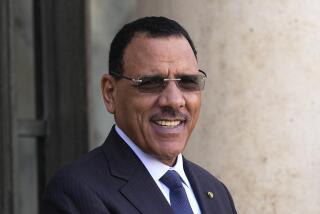Pakistani coup de grace
- Share via
Washington’s inability to deter Pakistan’s Gen. Pervez Musharraf from declaring emergency rule -- a coup d’etat that has been in the works for months -- reveals yet another Bush administration foreign policy failure. As the dictator’s goons used clubs and tear gas to crush pro-democracy demonstrations, arrested several thousand lawyers and human rights activists and muzzled the media, President Bush -- the chest-thumping, self-proclaimed defender of freedom and crusader against tyranny everywhere -- bravely declared that he hoped Musharraf would “take my advice” and hold elections soon. It was a grotesque finale to the now-abandoned doctrine that Bush advanced in his second inaugural address, when he argued that tyranny itself is the mother’s milk of extremism.
The Bush administration now sees itself forced to choose between U.S. interests and American principles, between fighting terrorism and preserving stability in a nuclear weapons state, and promoting if not Jeffersonian democracy then at least semi-enlightened governance under civilian, though authoritarian, law.
In fact, this is a false dilemma. Musharraf has never been either a democratic reformer or a reliable ally in the so-called war on terrorism. The truth is that all of the choices in Pakistan are bad. But pouring $10 billion down the gullet of a military dictatorship since 2001 has made U.S. options no better. (That figure does not include covert U.S. aid to Musharraf, estimated at perhaps $5 billion to $10 billion more.)
Despite all the cash, Musharraf has achieved meager results. Domestic terrorism has sharply increased. Foreign and home-grown jihadis have poured into Taliban and Al Qaeda sanctuaries in the tribal areas, fueling a dangerous resurgence of attacks against U.S., NATO and Afghan troops across the border in Afghanistan. The Pakistani army, having botched its campaigns in the tribal areas, has ignored U.S. pleas for a renewed operation against the rebel sanctuaries. And there are continuing, credible reports that elements of Pakistani intelligence continue to back the Taliban as a hedge against the U.S. and India.
With its best democratic and legal minds under house arrest or in jail, Pakistan is no closer to being able to hold free and fair elections than it was when Musharraf seized power in 1999. The general may stage sham elections in January, or whenever he has intimidated and arrested enough opponents to secure the outcome. But he will not relinquish power voluntarily. If Bush can do no more than call on Musharraf to restore sham civilian rule, Congress must. The U.S. has a profound interest in good relations with Pakistan, a nuclear-armed country of 165 million. But the U.S. can neither help build a stable society in Pakistan nor undermine terrorism by continuing to bankroll a repressive dictatorship.
More to Read
Sign up for Essential California
The most important California stories and recommendations in your inbox every morning.
You may occasionally receive promotional content from the Los Angeles Times.










